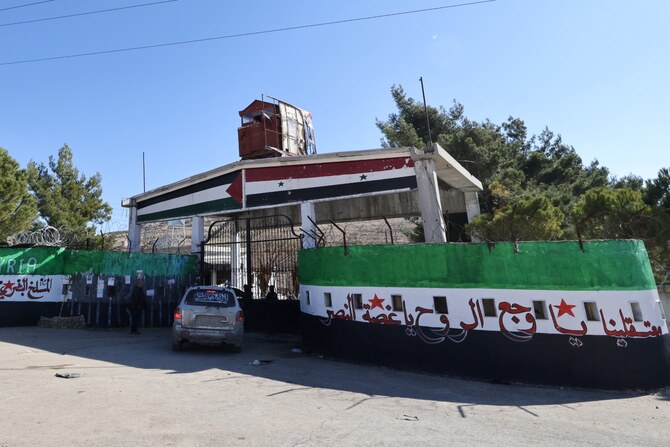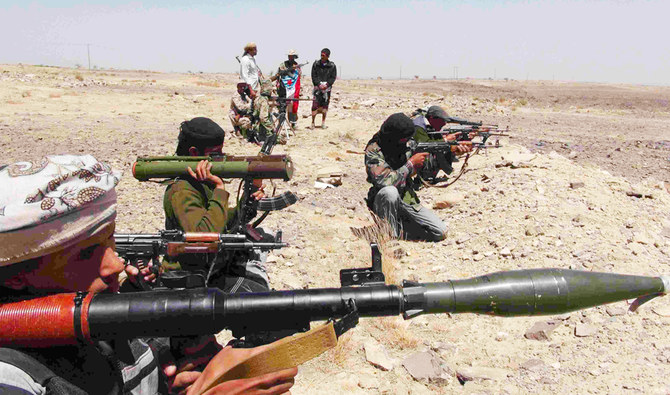AL-MUKALLA: A court controlled by Iran-backed Houthis on Tuesday sentenced 35 pro-government parliamentarians to death and confiscated their properties, a local lawyer who attended the trial said.
Abdul Basit Ghazi said on Facebook that the Specialized Criminal Court in Sanaa handed down the verdicts on members of the Yemeni Parliament charged with treason for supporting the internationally recognized government and military operations by the Saudi-led coalition in Yemen.
Convicted lawmakers included Sultan Al-Barakani, the parliamentary leader and his deputy Abdul Aziz Jubari; Ameen Al-Okaimi, governor of Jawf; Ali Amrani, Yemen’s envoy to Jordan, and several former ministers, tribal leaders and businessmen.
In February, Al-Barakani complained to Martin Griffiths, the UN envoy to Yemen, that Houthis had confiscated the property of 35 Yemeni MPs who supported the internationally recognized government.
Houthi extremists have stepped up their legal attacks on lawmakers since early last year when MPs met in Seiyun in Yemen’s Hadramout province for the first session of the Parliament since the beginning of the war.
Dozens of legislators in Houthi-controlled areas, including the current Parliament’s head, have switched sides and joined the internationally recognized government since December 2017 when militants killed former President Ali Abdullah Saleh.
Pro-government lawmakers who fled Sanaa say Houthis barred their peers from leaving the capital and forced them to attend the rebel-controlled Parliament. Houthi-controlled courts previously sentenced President Abed Rabbo Mansour Hadi, his deputy Ali Mohsen Al-Ahmer and the Prime Minister Maeen Saeed and other ministers to death for treason.
After the trial, armed Houthi fighters stormed the properties of the sentenced men and ordered local banks to freeze their accounts.
Political analysts say that Houthis are targeting opponents to justify confiscating properties and intimidate those who might consider fleeing areas under rebel control.
“They seek to accelerate looting properties of lawmakers, including houses and other properties in their areas. They also want to terrorize politicians and other lawmakers in Sanaa who plan to sneak out to government-controlled areas or outside the country,” Saleh Al-Baydhani told Arab News.
On the battlefields, fighting continues between government troops and Houthis in the province of Jawf and Nehim district, near Houthi-controlled Sanaa.
Government officials say that militants executed several opponents shortly after seizing control of Hazem on Sunday.
Yahyia Qoma, director of the Ministry of Information’s office in Jawf, said that Houthi militants killed several people on Tuesday and stormed opponents’ houses in Hazem. Houthis have made major gains in the northern province of Jawf after seizing control of Hazem, the capital of Jawf and Ghyal district.
The conflict began in late 2014 when Houthis seized control of Sanaa and placed Hadi under house arrest. The rebels extended their operations across Yemen, triggering a civil war that has killed tens of thousands of people, according to the UN.
Houthi court sentences 35 Yemeni lawmakers to death
https://arab.news/c9w6q
Houthi court sentences 35 Yemeni lawmakers to death

- Dozens of legislators in Houthi-controlled areas, including the current Parliament’s head, have switched sides and joined the internationally recognized government since December 2017 when militants killed former President Ali Abdullah Saleh
UNRWA chief vows to continue aid to Palestinians despite Israeli ban

OSLO: The UN’s Palestinian refugee agency UNRWA will continue to provide aid to people in the Palestinian territories despite an Israeli ban due to be implemented by the end of January, its director said Wednesday.
“We will ... stay and deliver,” UNRWA chief Philippe Lazzarini told a conference in Oslo. “UNRWA’s local staff will remain and continue to provide emergency assistance and where possible, education and primary health care,” he said.
Erdogan says Turkiye can ‘crush’ all terrorists in Syria

ANKARA: Turkish President Tayyip Erdogan on Wednesday urged all countries to “take their hands off” Syria and said Turkiye had the capacity and ability to crush all terrorist organizations in the country, including Kurdish militia and Islamic State.
Speaking in parliament, Erdogan said the Kurdish YPG militia was the biggest problem in Syria now after the ousting of former President Bashar Assad, and added that the group would not be able to escape its inevitable end unless it lays down its arms.
World must keep pressure on Israel after Gaza truce: Palestinian PM

OSLO: The international community will have to maintain pressure on Israel after an hoped-for ceasefire in Gaza so it accepts the creation of a Palestinian state, Palestinian Prime Minister Mohammed Mustafa said on Wednesday.
A ceasefire agreement appears close following a recent round of indirect talks between Israel and Hamas, with US Secretary of State Antony Blinken saying late Tuesday that a deal to end the 15-month war was “on the brink.”
“The ceasefire we’re talking about ... came about primarily because of international pressure. So pressure does pay off,” Mustafa said before a conference in Oslo.
Israel must “be shown what’s right and what’s wrong, and that the veto power on peace and statehood for Palestinians will not be accepted and tolerated any longer,” he told reporters.
He was speaking at the start of the third meeting of the Global Alliance for the Implementation of the Two-State Solution to the Israeli-Palestinian Conflict, gathering representatives from some 80 states and organizations in Oslo.
Norwegian Foreign Minister Espen Barth Eide, the host of the meeting, said a “ceasefire is the prerequisite for peace, but it is not peace.”
“We need to move forward now toward a two-state solution. And since one of the two states exists, which is Israel, we need to build the other state, which is Palestine,” he added.
According to analysts, the two-state solution appears more remote than ever.
Prime Minister Benjamin Netanyahu, firmly supported by US President-elect Donald Trump, is opposed to the creation of a Palestinian state.
Israel is not represented at the Oslo meeting.
Norway angered Israel when it recognized the Palestinian state, together with Spain and Ireland, last May, a move later followed by Slovenia.
In a nod to history, Wednesday’s meeting was held in the Oslo City Hall, where Yasser Arafat, Yitzhak Rabin and Shimon Peres received the Nobel Peace Prize in 1994.
The then-head of the Palestinian Liberation Organization, Israeli prime minister and his foreign minister were honored for signing the Oslo accords a year earlier, which laid the foundation for Palestinian autonomy with the goal of an independent state.
Syrians in uproar after volunteers paint over prison walls

DAMASCUS: Families of missing persons have urged Syria’s new authorities to protect evidence of crimes under president Bashar Assad, after outrage over volunteers painting over etchings on walls inside a former jail.
Thousands poured out of prisons after Islamist-led rebels toppled Assad last month, but many Syrians are still looking for traces of tens of thousands of relatives and friends who went missing.
In the chaos following his ouster, with journalists and families rushing to detention centers, official documents have been left unprotected, with some even looted or destroyed.
Rights groups have stressed the urgent need to preserve “evidence of atrocities,” which includes writings left by detainees on the walls of their cells.
But a video appearing to show young volunteers paint over such writings at an unnamed detention center with white paint and adorning its walls with the new Syrian flag, the depiction of a fireplace or broken chains has circulated on social media in recent days, angering activists.
“Painting the walls of security branches is disgraceful, especially before the start of new investigations into human rights violations” there, said Diab Serriya, a co-founder of Association of Detainees and Missing Persons of Saydnaya Prison (ADMSP).
It is “an attempt to destroy the signs of torture or enforced disappearance and hampers efforts to... gather evidence,” he said.
Jomana Hasan Shtiwy, a Syrian held in three different facilities under Assad, often changing cells, said the writings on the walls held invaluable information.
“On the walls are names and telephone numbers to contact relatives and inform them about the fate of their children,” she said on Facebook.
In each new cell, “we would write a memory so that those who followed could remember us,” she said.
A petition appeared on Tuesday calling for the new Syrian authorities to better protect evidence, and give investigating the fate of those forcibly disappeared under Assad “the highest priority.”
It slammed what it called “the insensitive treatment of the sanctity” of former detention centers.
“Some have gone as far as to paint cells, obscuring their features, which for us represents... a great wronging of detainees,” said signatories, including ADMSP.
The president of the International Committee for the Red Cross said last week determining the fate of those who went missing during Syria’s civil war would be a “huge challenge.”
Mirjana Spoljaric said the ICRC was following 43,000 cases, but that was probably just a fraction of the missing.
The Syrian Observatory for Human Rights, a Britain-based war monitor, says more than 100,000 people have died in detention from torture or dire health conditions across Syria since 2011.
Iran’s navy unveils its first signals intelligence ship

DUBAI: Iran’s navy received its first signals intelligence ship on Wednesday, semi-official Tasnim news organization reported, a few days after the country’s army took delivery of 1,000 new drones.
The Zagros is a new category of military vessel equipped with electronic sensors and the ability to intercept cyber-operations and conduct intelligence monitoring, Tasnim said.
“The Zagros signals intelligence ship will be the watchful eye of Iran’s navy in the seas and oceans,” Navy Commander Shahram Irani said.
Earlier this month, Iran started two-month-long military exercises which have already included war games in which the elite Revolutionary Guards defended key nuclear installations in Natanz against mock attacks by missiles and drones.
The military drills and procurement come at a time of high tensions with arch-enemy Israel and the United States under incoming US president Donald Trump.
In October, the spokesperson of Iran’s government said the country plans to raise its military budget by around 200 percent to face growing threats.
















